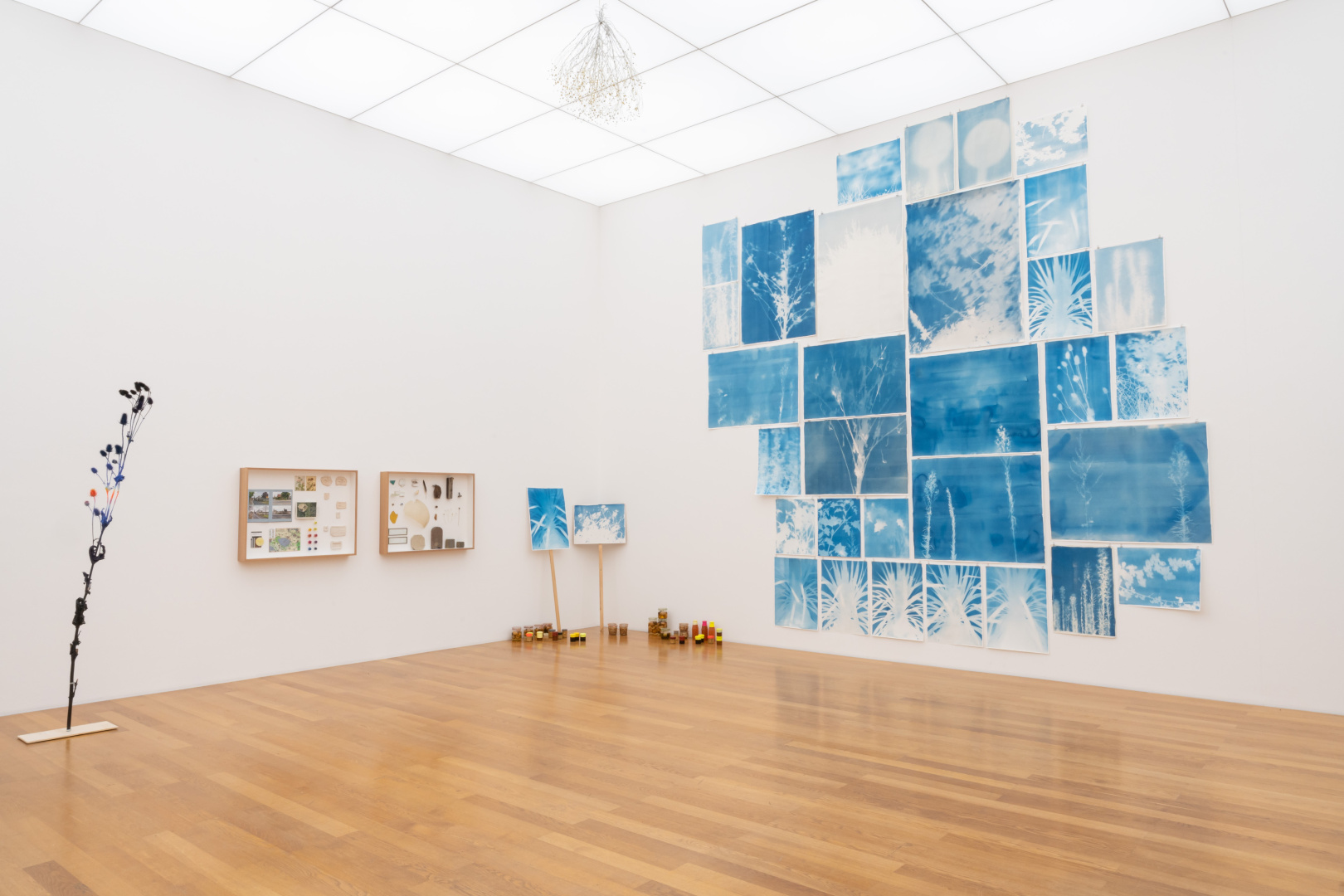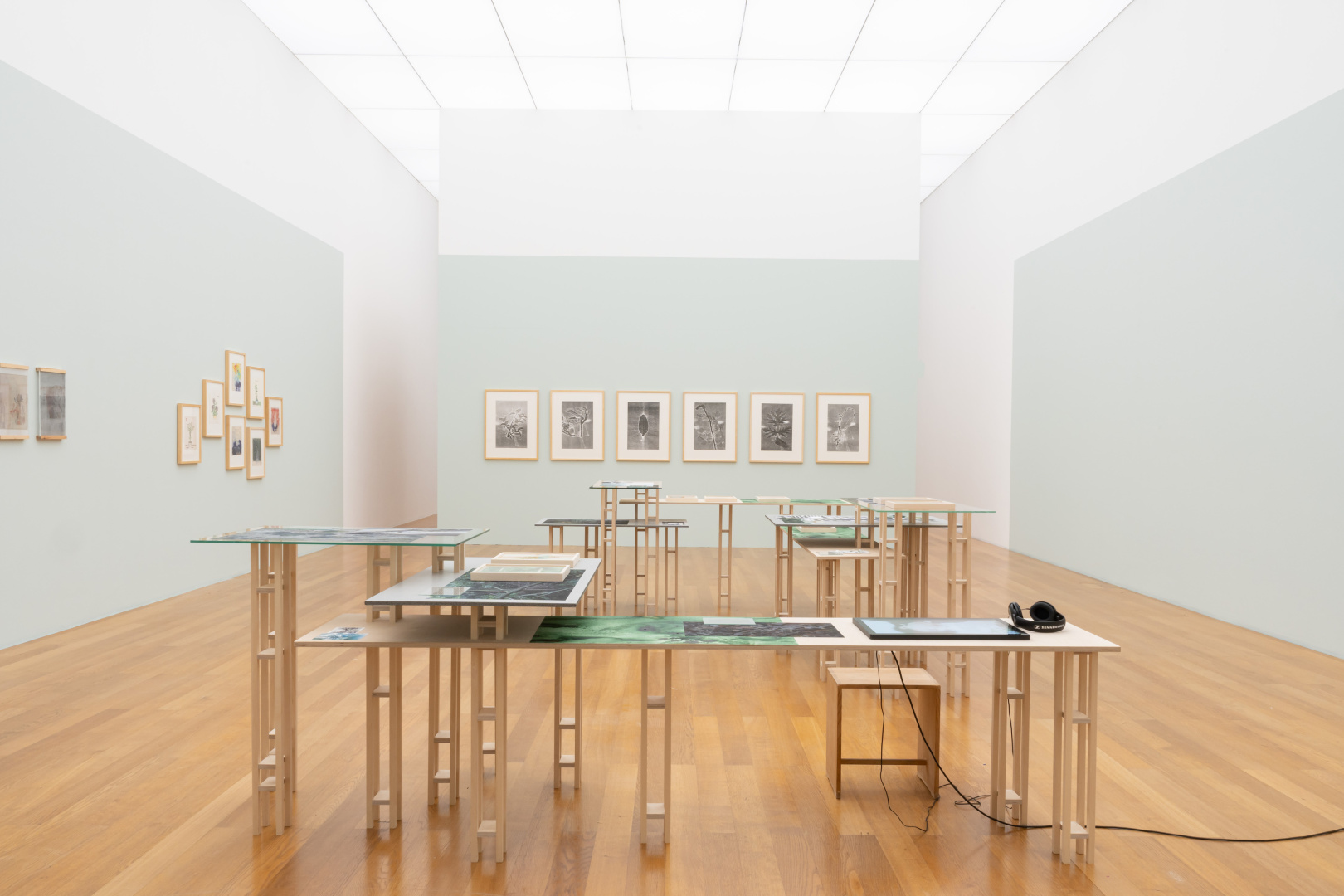The exhibition Parliament of Plants II gives a voice to plants. It testifies to a new view of these beings, which are inextricably linked with our own survival. Over the past decades, a paradigm shift has been taking place in the sciences regarding our perception of plants, one that is also reflected in the exhibition's artworks. Following on from Parliament of Plants (2020–21), the show develops a network of cooperations in a range of different disciplines, with guest contributions in the form of 'inserts'.
Parliament of Plants II demonstrates the principle of symbiosis as a societal counter-image to
the parasitic handling of nature. New insights regarding the world of plants feature alongside
the knowledge of Indigenous cultures, questions pertaining to colonial and contemporary history, the handling of resources or our perception of time. The crucial question is: how can we achieve a symbiotic coexistence in which human and non-human beings can learn from each other?
The main themes of two 'raised stands' are Michel Serres' Natural Contract and Lynn Margulis' theory of symbiosis. Co-curated with Hans-Jörg Rheinberger, molecular biologist and historian of science.
Participating artists
Polly Apfelbaum, Ursula Biemann, Anna Hilti, Alevtina Kakhidze, Jochen Lempert, Rivane Neuenschwander & Mariana Lacerda, Uriel Orlow, Silke Schatz, Thomas Struth, Athena Vida, Miki Yui, Zheng Bo.
The exhibition includes two inserts, a project space in the side-light gallery and a wide range of further collaborations and cooperations:
Insert I: Politics of Plants
curated by Linda Schädler, head of ETH's Prints and Drawings Collection, Zurich.
Sourced from the ETH's Prints and Drawings Collection, visitors can discover artistic positions that deal with current topics: borders, the question of the Self and the Other, the dominance of culture or nature, but also economic interests or geopolitical aspects of natural resources, among others.
Participating artists: Mireille Gros, Matthew Day Jackson, Monica Ursina Jäger, Daniela Keiser, Pascal Schwaighofer, Melanie Smith, Sebastian Utzni.

Insert II: Plants_Intelligence. Learning like a Plant
a research project at the Institute Art Gender Nature, Academy of Art and Design FHNW, Basel, with the support of the Swiss National Science Foundation.
The research project on show here, Plants_Intelligence. Learning like a Plant, sets out to widen the debate about plant knowledge and to harness it to social, ecological and ethical behaviour by collaborating closely with representatives from a variety of fields of knowledge.
Research team: Yvonne Volkart (head), Felipe Castelblanco, Julia Mensch, Rasa Smite.
Participating artists: Felipe Castelblanco, Julia Mensch, Rasa Smite, Raitis Smits.


Project space Parliament of Plants II
curated by Annett Höland, co-curator of the exhibition.
The side-light gallery showcases a range of regional protagonists committed to nature conservation. By examining various examples of different habitats, the aim is to present ways to create a better balance between human beings and nature – and ask if it is possible to accord plants legal rights.
Contributions by
Mario F. Broggi; Gemeinde Vaduz – Projekt "Vadoz summt"; Nicolas Humbert; IG Netzwerk Biodiversität; Liechtensteinische Gesellschaft für Umweltschutz; Liechtenstein-Institut; Liechtenstein School of Architecture – "Pro Bono" students' project with Luis Friedmann, Noah Laternser, Luca Strimmer; Maurice Maggi; Verein Feldfreunde and others.
Pop-up Gardens in Vaduz
School classes in collaboration with the project "Vadoz summt", the museum's art education team, Damiano Curschellas and Piero Good.
Events with
AckerKüche, Cyrus Beck, Manuel Beck, DJ Kejeblos, Michael Donhauser, Peter Goop, Anna Hilti, Luis Hilti, Nicolas Humbert, Wilfried Marxer, Anna Ospelt, Claudia Ospelt-Bosshard, Duscha Padrutt, Hans-Jörg Rheinberger, Linda Schädler, Samira Schädler, Elias Kindle, Yvonne Volkart, Andreas Weber and others.
Additional cooperation partners
domus, Schaan; Haus Gutenberg, Balzers; Küefer-Martis-Huus, Ruggell; Literaturhaus, Schaan; Skino, Schaan and others.
A production of Kunstmuseum Liechtenstein, curated by Christiane Meyer-Stoll.
Multiple visits to the exhibition
To allow you to view the extensive exhibition at your own pace, paid admission is valid for 14 days. During this time you can visit the museum free of charge as often as you like. Just keep the receipt from your first visit and show it next time you come.
Image: Jochen Lempert, Calla-Leuchten, 2023 (detail)
Courtesy BQ, Berlin, and ProjecteSD, Barcelona © Jochen Lempert / 2023, ProLitteris, Zurich







